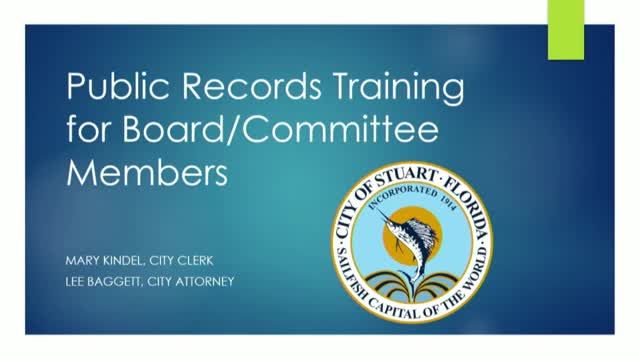City clerk and attorney brief advisory board on public records and Sunshine Law, caution on social media
Get AI-powered insights, summaries, and transcripts
Subscribe
Summary
The City of Stuart clerk and city attorney gave an orientation to the Local Planning Agency on public records obligations and the Sunshine Law, emphasizing that board members' emails, texts and social media interactions about city business can be public records and urging use of city-assigned email for official correspondence.
City Clerk Mary (last name not specified) and City Attorney Lee Baggett gave an advisory‑board orientation and public‑records presentation outlining legal obligations for Local Planning Agency members under Florida’s Sunshine Law and public records statutes.
Mary, the City Clerk, told members that the public records law applies to elected and appointed board members and that "the content is what we're looking for" — meaning records created or received in connection with city business are public regardless of where they are stored. She said the city issues a city‑assigned email address to board members and recommended forwarding any personal emails about city business to that address so staff can collect records when a public‑records request is made.
Lee Baggett and Mary cautioned about social media and texting. Baggett summarized a recent federal case involving an elected official’s personal social‑media page and explained courts weigh whether an official uses a personal account to carry out official duties; if so, posts may become public records. Baggett said the courts look at whether the account is used "in furtherance of their official duties and whether the presentation of the account is connected with the official's position." He warned that deleting comments or removing content could expose officials and the city to litigation and possible attorney's‑fee awards.
Clerk Mary walked the board through practical steps: preserve records on personal devices when they relate to city business, forward city‑related emails to the city email account, and submit screenshots of texts or social posts when requested. She explained that after a board member’s term ends the city will ask for any remaining records and that members must file financial disclosures with the state Commission on Ethics each year (due July 1).
Both presenters urged members to contact the clerk’s office or city attorney with questions and stressed the city will handle public‑record requests. The training emphasized disclosure of any ex parte communications in quasi‑judicial proceedings; as Baggett reminded the board, members must disclose private conversations about an application before deliberating.
The presentation closed with a reminder that failing to preserve or produce public records can carry civil and criminal penalties, attorney's‑fee exposure, and other sanctions; both the clerk and the attorney encouraged members to err on the side of preservation and to reach out with questions.
